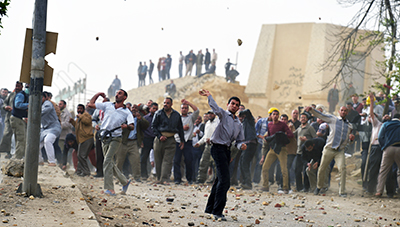New York, March 25, 2013–The Committee to Protect Journalists is alarmed by the violent siege on Sunday of the Media Production City, a complex housing numerous private news outlets in Cairo, an episode that followed a series of inflammatory anti-press comments by President Mohamed Morsi and members of the Muslim Brotherhood.
“President Morsi’s escalated rhetoric against the critical press is deeply troubling,” said Sherif Mansour, CPJ’s Middle East and North Africa coordinator. “The president is not meeting his responsibility to set a tone of tolerance and respect for viewpoints that differ from his own and those of the Muslim Brotherhood.”
An escalation in anti-press rhetoric by the president followed a week of violent protests outside the Muslim Brotherhood headquarters in Cairo that reached a high point on Friday. In a speech Sunday, Morsi accused owners of private news outlets of criticizing and insulting him, and said the media had incited violence by covering only the attacks on protesters–and not those on Muslim Brotherhood members, news reports said.
Echoing those remarks, the Muslim Brotherhood used social networking sites to call for a siege on Sunday of the Media Production City in Cairo. A Facebook group, called “We are the Muslim Brotherhood youth, learn about us,” encouraged protesters to besiege the studios of five private satellite channels–Al-Hayat, ONTV, Al-Nahar, Al-Qahira wal Nas, and CBC–located inside the Media Production City. The outlets are known for criticizing the Muslim Brotherhood group.
On Thursday, the National Security Committee–a part of the Egyptian upper house of parliament–accused the private media of biased coverage and said that the government should censor private outlets, according to news reports. An official in the meeting, Essam al-Erian, a Muslim Brotherhood majority leader, also threatened an Al-Watan correspondent, saying he had “surprises for them … that would make everyone in the media know their limits,” the paper reported.
On Sunday, members and supporters of the Muslim Brotherhood surrounded the Media Production City, closing the gates and refusing entrance to journalists and guests. Protesters assaulted journalists to prevent them from filming, and chanted threatening slogans to journalists inside the city, saying they would be slaughtered for their insults to Morsi, according to news reports.
Hussein Abdel Ghany, a prominent news host and a former correspondent of Al-Jazeera in Egypt, told CPJ that he was attacked by 10 individuals outside the city and the windshield of his car broken. He said protesters attempted to take him out of his car and beat him, but that his driver prevented the attack.
Reham al-Sahli, a host of the talk show “90 Minutes” was attacked and her car damaged in the protests, according to news reports. Diaa Rashwan, head of the Egyptian Journalists Syndicate, was prevented from entering Media Production City, reports said.
A journalist at Al-Ahram Weekly, Khaled Dawoud, told CPJ he had received death threats as a result of his writings and his role as a media spokesman for the National Salvation Front, an opposition organization that includes liberal and leftist parties. Muslim Brotherhood supporters claim that the organization provides a “political cover” for the violent protests against them.
“Authorities are prosecuting critics while ignoring numerous attacks against journalists last week alone,” said Mansour. “The attacks that took place at the gates of Media Production City demand immediate judicial intervention.”
Today, Egypt Prosecutor General Talaat Abdullah ordered the arrests of five activists and journalists after Muslim Brotherhood members accused them of inciting violence following Morsi’s speech, according to news reports. The prosecutor also imposed a travel ban on them. The list includes Alaa Abdel Fattah, a prominent blogger who was accused and fined last year for “insulting the military,” according to news reports. Abdel Fattah vowed on his Facebook account to appear in front of the prosecutor tomorrow to challenge the “fabricated charges” against him, while others, including columnist and activist Hazim Abdel Azim, decided to ignore what they considered an “illegitimate” arrest warrant, according to news reports.
Abdullah was appointed by Morsi last November in a move that resulted in series of protests from the opposition and strikes within the judiciary. He has referred dozens of journalists and media professionals in the past few months for investigation by public prosecutors because of accusations of criminal defamation of President Morsi.
- For more data and analysis on Egypt, visit CPJ’s Attacks on the Press.
